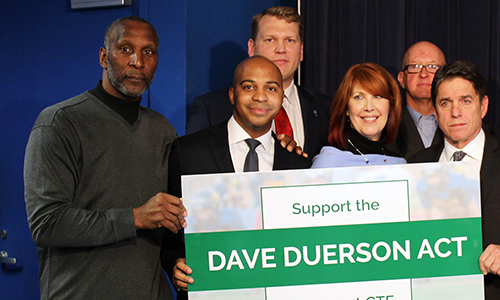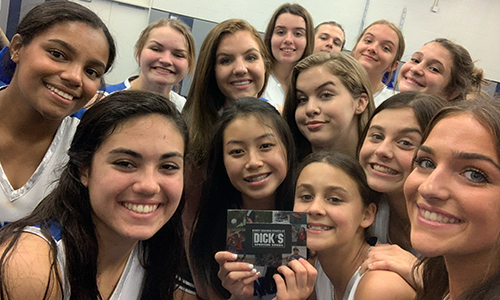GET INVOLVED
Participate in Research
Why participate in research?
Research is the key that unlocks our ability to prevent and treat the effects of brain trauma. Brain bank research has provided undeniable evidence of how repetitive brain trauma affects behavior, thinking and memory. Clinical research on human volunteers plays an equally critical role in accelerating progress and can provide crucial insights on potential treatments. You can scroll down this page to learn about actively recruiting research studies that you may be eligible for.
First, watch Dr. Robert Stern, director of clinical research at the Boston University CTE Center, explain why you should participate in research.
Imminent Brain Donation
For imminent brain donation matters, please call the 24-hour emergency donation pager at 617.992.0615.
For imminent brain donation matters in Australia, email SPORTS Brain Bank or call the 24-hour line at (02) 8005 6891.
Sign up for the CLF Research Registry
The CLF Research Registry comprises the Brain Donation Registry (BDR) and Clinical Research Registry (CRR). You may sign up for one or both. All adults, with or without a history of sports participation or military service, are eligible to join the Research Registry.
BDR members will receive a personalized brain donor card and informational brochure. CRR members will receive regular communications recruiting them to clinical research studies on concussions and CTE. Click here to join the Research Registry or learn more.
Project S.A.V.E
Location: Boston University or the University of California, San Francisco
Seeking: Men and women age 50 or older who played 5+ years of a contact sport, including American football, ice hockey, soccer, lacrosse, boxing, full contact martial arts, rugby, and wrestling. The study consists of a 1-2 day study visit at either Boston University or the University of California, San Francisco. Each visit will consist of an advanced MRI of the brain; neurological, cognitive, self-report mood and behavior exams; blood samples; and an optional lumbar puncture. Participants will return annually.
Goal: S.A.V.E. stands for Study of Axonal and Vascular Effects from repetitive head impacts. The major goal of this study is to determine how repeated head impacts from playing contact sports can lead to long-term thinking, memory, and mood problems. The results of this study could inform on strategies to treat and prevent symptoms associated with head impacts from contact sports.
To participate in Boston: Phone: (617) 358-6545 Email: joinhope@bu.edu
To participate in San Francisco: Email: karen.smith@ucsf.edu
Molecular Imaging of Brain Injury and Repair in NFL Players
Location: Baltimore
Seeking: Researchers at Johns Hopkins are seeking former NFL players who played for two or more seasons and whose last season was within the last five years. Participants must be between 25 and 40 years old and have no history of psychiatric disease. Qualified participants will undergo a PET scan, an MRI scan, and an optional lumbar puncture. Those completing the study will receive compensation for time and travel to Baltimore.
Goal: The purpose of this study is to track markers of injury and repair, provide data to analyze concussions, determine the severity of the effects, and determine the overall long term health impact on the players.
Interested in participating? Contact Dr. Jennifer Coughlin at jcoughl2@jhmi.edu or 443.287.4701.
FIND-CTE Study
Focused Imaging for the Neurodegenerative Disease Chronic Traumatic Encephalopathy
Location: Study sites in the Boston, MA and San Francisco, CA areas
Seeking: Former NFL players between 45 and 80 years old. Participation will include study visits at one of the two study cites for the FIND-CTE evaluation which includes two positron emission tomography (PET) scans; as well as an Alzheimer's Disease Research Center evaluation including neurological, cognitive, self-report mood and behavior exams; advanced magnetic resonance imaging (MRI) scans; and a collection of blood samples.
Goal: The major goal of the FIND-CTE research project is to develop methods of diagnosing CTE during life, so that interventions can be developed to help those affected by this disease.
HITSS Study
Head Impact & Trauma Surveillance Study
Location: Entirely online at www.HITSS.org
Seeking: Anyone aged 40+ who played soccer or tackle football at any level – youth, high school, college or pro/elite. Participation is a fully-online survey that includes questionnaires on sports participation, medical history and behavior and mood, and brain games. It only takes approximately two hours to complete, and can be completed at any time and over several days, if desired. Participants are then asked to take a follow up assessment online one year later.
Goal: The major goal of HITSS is to answer questions about risks of developing later life brain health issues from repetitive head impacts in contact sports. To learn more or to participate click here.
Contact: HITSS@BU.edu
HOPE CTE Study
Health Outreach Program for the Elderly
Location: Greater Boston
Seeking: Male and female subjects who are at least 50 years old, played a minimum of five years of football, MMA, boxing, rugby, soccer, or ice hockey, with two of those years occurring at the collegiate, semi-professional, or professional levels. Participants will have a two-day visit once a year to the BU School of Medicine to participate in a variety of tests, including a neurologic exam, memory and cognitive tests, mood and behavior questionnaires, a blood draw, and an MRI scan.
Goal: The HOPE Chronic Traumatic Encephalopathy (CTE) study is designed to develop methods of diagnosing CTE during life. This is an extension of the Health Outreach Program for the Elderly (HOPE) Study of the Boston University Alzheimer’s Disease Center.
Interested in participating? Contact joinHOPE@bu.edu or 617.358.6545.
Operation Synchrony
Location: Southern California
Seeking: Researchers at Wave Neuroscience and Brain Treatment Centers are seeking 120 post-9/11 military service members and Veteran participants. This outpatient program is completely FREE, due to the additional support of our friends at the Wounded Warrior Project, and focuses on treating the mental health of military service members and Veterans. Wave Neuroscience empowers non-pharmaceutical, non-invasive EEG guided neuromodulation to try to aid in better sleep, better focus, better mood, better emotional regulation and will improve your overall cognition.
Goal: The purpose of this study is to track changes in symptoms of Persistent PCS, PTSD, Quality of Life Enjoyment, and Incidents and Adverse Behavior in post-9/11 military service members and Veterans.
Interested in participating? Visit www.braintreatmentcenter.com/wwp
Athlete Brain Health & Aging Study
Athlete Brain Health & Aging Study
Location: National
Seeking: Former NFL players, former Division I college football players, and former male college athletes who never played contact sports.
Goal: The purpose of this research study is to use research to improve health and support the well-being of men of all ages. Previous research on brain health has focused on biological factors, but we know that a person’s psychology, personal beliefs, social groups, and surroundings are also fundamental for brain wellness. These psychosocial factors vary for different groups, such as among Black, White, and Latino men, but more must be understood about how these factors affect brain health. The goal of this study is to discover the effects these important factors have on brain aging to support people like you, your friends, family, and community members.
Interested in participating? Click here to learn more.
Boston University COVID & Cognition Study
BU COVID & Cognition Study
Location: Nationwide
Seeking:
- At least 18 years of age
- Fluent in English
- Access to an Internet-connected smartphone (iOS or Android) or tablet device
- No plan to undergo any major treatments or surgery during the next 6 months
- No diagnosis of dementia, stroke, or major depressive disorder
- No admission to the Intensive Care Unit (ICU) since 2018
- No history of head injury or concussion
Background & Detail:
Many COVID-19 patients experience neurological consequences, such as problems with memory, attention, and brain fog. There is currently a lack of understanding of how COVID-19 impacts neurological functioning, cognition, and mood. Gather more information on the neurocognitive impact of COVID-19 could help develop treatments that aim to produce better outcomes while better characterizing the effects of COVID-19 on the brain.
This project will use mobile-based assessments, including smartphones and tablets, to characterize the neurocognitive effects of COVID-19 with higher precision and frequency than done with traditional neuropsychological testing. We aim to determine whether the cognitive capacity, mood, and sleep patterns of individuals who have ever been infected with COVID-19 is distinguishable from individuals who have never been infected with COVID-19. Having ever been infected with COVID-19 will distinguish the two groups recruited in the study (Group 1: Ever-COVID; Group 2: Never-COVID). The date and reported severity of COVID-19 infection, as well as details related to changes in lifestyle will be recorded to help characterize their recovery trajectory.
The first smartphone application used in this project consists of 7 cognitive tasks and 2 questionnaires, and in total is expected to take around 15 minutes to complete. The second smartphone application used in this project involve assessing cognition through voice and speech elicitation tasks, and is expected to take around 8 minutes to complete. Participants will complete a practice session with the smartphone applications in the presence of a study staff during the remote study visit to ensure they are comfortable using the applications.
Following the remote study visit, participants will be asked to complete one assessment per week on each application for the first 1.5 months (6 weeks) of the study, followed by an additional 6 assessments (at minimum) over the remaining 4.5 months in the study. At the end of the study participation, participants will also be asked to complete a study survey to provide feedback on their experience in the study and use of the smartphone applications. Participants will be eligible to receive gifts cards for completing assessments. A $25 gift card will be mailed to participants following the completion of the first 6 assessments over the course of the first 1.5 months of the study, followed by another $25 gift card if they complete an additional 6 assessments (at minimum) over the remaining 4.5 months of the study.
Learn more at the link below.
You May Also Like

Help us raise awareness about concussions, PCS and CTE in your community. Learn how to create positive change by becoming a CLF Champion.
Become a CLF Champion
There are many ways you can help contribute to CLF. See how you can fundraise in your community and beyond to support our work.
Ways to Give